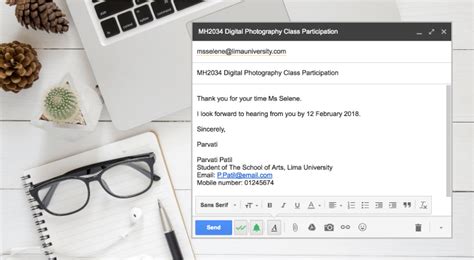How To End An Email As A College Student
Ronan Farrow
Feb 24, 2025 · 2 min read

Table of Contents
How to End an Email Like a College Pro: Closing Lines That Impress
As a college student, you're juggling classes, extracurriculars, and maybe even a part-time job. Email is your lifeline for communication – with professors, potential employers, and mentors. A strong email closing can make the difference between a response and a deleted message. Let's master the art of the college student email sign-off.
Beyond "Sincerely": Finding the Right Closing for Every Situation
The classic "Sincerely" is safe, but it lacks personality. Your email closing should reflect the context and your relationship with the recipient. Here are some options, categorized for clarity:
Formal Emails (Professors, Potential Employers):
- Respectfully: This conveys politeness and respect without being overly familiar. Ideal for initial contact or formal requests.
- Regards: A slightly less formal yet still professional choice. Suitable for most academic and professional communications.
- Thank you for your time and consideration: Specifically useful when requesting something (e.g., a meeting, a letter of recommendation). It shows gratitude and emphasizes your awareness of their time constraints.
- Best regards: A solid and widely accepted option for formal communication.
Semi-Formal Emails (Advisors, TAs, Networking Contacts):
- Best: A versatile option that bridges the gap between formal and informal.
- Cordially: Shows warmth and professionalism, suitable for ongoing communication.
- Kind regards: Expresses politeness and genuine concern.
Informal Emails (Friends, Classmates, Familiar Professors):
- Thanks, A casual and quick way to end an email to someone you know well.
- Talk soon, Suitable for emails involving casual plans or follow-ups.
- Cheers, A more informal and friendly option appropriate for a more relaxed tone.
Pro-Tip: Personalize Your Closing
A personalized closing can make your email stand out. Consider adding:
- Your name: Always include your full name, especially in formal emails.
- Your student ID number: This can be helpful in emails to professors or administrative staff.
- Relevant contact information: If necessary, repeat your phone number or preferred contact method.
What to Avoid:
- Overly casual closings: Avoid slang or overly informal language, even in emails to friends in an academic context.
- Generic closings: "Best" or "Regards" are great, but make sure the overall tone matches.
- No closing at all: This looks unprofessional and inconsiderate. Always end with a closing statement.
Putting it All Together: Crafting a Killer College Student Email
Remember, your email closing is the final impression. Choose your closing carefully to reflect the tone and context of your email. By using the right closing, you can elevate your professionalism and leave a lasting positive impact.
Keyword Optimization: College student email, email closing, professional email, email etiquette, academic email, formal email, informal email, email signature, student communication, professional communication, impress professors, email tips for students.
By following these guidelines, you'll confidently craft emails that get noticed and achieve your communication goals!
Featured Posts
Also read the following articles
| Article Title | Date |
|---|---|
| How To Increase Battery Health Iphone 11 Pro Max | Feb 24, 2025 |
| How To Backup Whatsapp To Internal Storage | Feb 24, 2025 |
| How To Become Member On Youtube Live | Feb 24, 2025 |
| How To Block Private Calls On An Iphone | Feb 24, 2025 |
| How To Block Tiktok Videos | Feb 24, 2025 |
Latest Posts
Thank you for visiting our website which covers about How To End An Email As A College Student . We hope the information provided has been useful to you. Feel free to contact us if you have any questions or need further assistance. See you next time and don't miss to bookmark.
